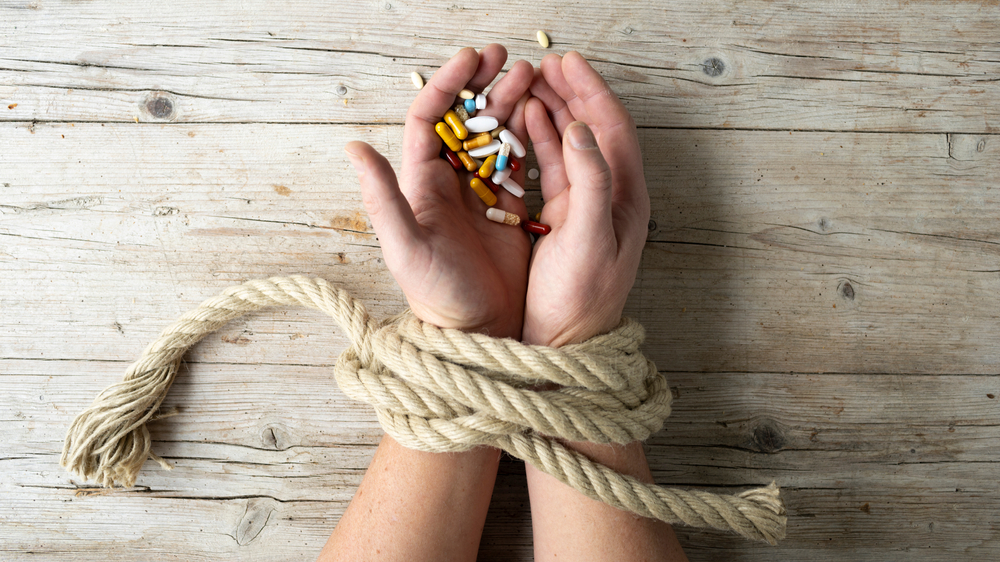Last Updated:
June 4th, 2025

Providing sufficient care and support to a loved one going through addiction can sometimes feel like an insurmountable task. For many of us, our desire to help can actually outweigh what we are physically capable of, especially when supporting them alone.
In the UK, over a quarter of a million people contacted drug and alcohol services seeking support in 2022, while an untold number of people support a loved one with their addiction every day.
How can we define an addiction?
The term “addiction” is defined among the general population as
”Being addicted to a particular substance, thing, or activity.”
Historically, the word “addiction” meant being “given over” or devoted to something or doing something habitually, leading to a negative or positive outcome.
To help strengthen the services of drug treatment, medical professionals later split the term into two categories; substance and nonsubstance addiction. Having an addiction to certain foods, for example, doesn’t carry the same risks as being addicted to drugs, though there are common risk factors that predispose a person to both.
More recently, addiction has been increasingly seen as something more disease-like in nature. For professionals who diagnose and help people escape addiction, The Diagnostic and Statistical Manual of Mental Disorders (DSM) has become an invaluable tool. Yet the DSM itself often avoids using the term addiction, instead referring to it as “substance abuse” and “dependence,” collectively called “substance use disorders.”
Seeing a family member or friend suffer from substance addiction can be profoundly upsetting, yet there are ways to provide a shining light of support during their darkest times. Our aim today is to help kindle that light.
Ensuring you recognise a genuine addiction
Firstly, if you start to see problems forming as a loved one struggles with drug or alcohol addiction, it is important to understand and identify the addiction itself for what it is.
Let’s say you see your spouse drinking more than usual, and you’re undecided on whether a dangerous addiction is forming, or they are “just drinking a little more than usual.” Early questions might form in your mind that hold you back from bringing it up, such as:
“Am I overreacting or being too judgemental of their addiction? Will they look at me differently if I tell them I am concerned?”
You may notice new problems forming in their personal and professional lives, including:
- Physical condition and health
- Work performance
- Financial stability
- Impaired social skills without the substance
- Legal issues
- Worsened self-esteem and self-respect
- Deteriorating personal hygiene
Recognising some or all of these issues forming means you are probably not overreacting, and your concerns are justified. Seeing these problems makes you want to reach out and help them, but you might be worried about how they’ll react or the method in which you do it.
Especially when speaking to someone we love, we can overthink our concerns, to the point where we’re too mentally exhausted even to broach the subject. In truth, this often means that the fear of how they’ll react has overpowered the genuine, heartfelt desire to help them. This can have devastating and fatal results if a true addiction is forming.

Guidance on how you can help someone struggling with addiction
After gaining a better understanding of the depth of a loved one’s addiction, you might benefit from some guidelines and principles that increase the likelihood of your concerns getting through to them.
This person needs direction, encouragement and, perhaps most of all, love and commitment throughout their journey. Here are some practices and principles on how to care for someone struggling with addiction:
Recognise yourself as someone who can give advice
The first tip we recommend is to make sure you truly see yourself as someone powerful enough to help, even just by starting the conversation. Equip yourself by learning more about drug and alcohol addiction, and familiarise yourself with common signs and symptoms. Ground yourself with some introductory knowledge of addiction.
If you rely on or depend on this person, such as a parent or spouse, you might feel apprehension about what comes after the conversation. Your relationship’s dynamic could make it hard to get the ball rolling. It may not be the time for “intervention” talk yet but don’t underestimate your potential to be the catalyst for positive change. Take solace in the fact that bravery is needed to reach out to them in the first place.
Offer your genuine support
After researching signs of addiction and developing your self-esteem enough to know that you can support them, the time may be right to open up and directly raise your concerns. Choose a calm moment in a place where you can easily communicate.
People suffering from an alcohol or drug addiction often lose sight of how much they are loved. The inner monologues of a person with a substance use disorder can be so dark that they don’t see themselves as worthy of your support, love, or affection. This can be frightening and heartbreaking to witness, so stay steadfast in your resolve.
Encourage them to seek help
Substance addictions often spiral downward and like any other disease, the earlier it is recognised and treated, the better. Being caught in the spiral of addiction can make them feel as though life is getting worse the longer it goes on.
Let them know that you’ve researched addiction and you know (or feel) that professional help is needed. Do it in a way that doesn’t make them feel guilty or ashamed. If you’re met with a hurtful or defensive response, there could be the need for assistance from intervention specialists, so continue researching
Be there for them throughout the process
If you successfully reach out to them and they begin the journey to recovery, your sustained support can be crucial throughout the process. It might take a lot of willpower and courage as they begin treatment, so let them know your care won’t fade away.
The treatment process might feel like a brand new and terrifying activity for them. They are trying something new, so reciprocate and support them in new ways. Attend their meetings if possible, or introduce them to new support groups.
Thoroughly take care of yourself
Sustaining your support for a loved one throughout recovery is not easy. Even if you’ve convinced yourself and told them that your support is unbreakable, everlasting and unconditional, there may be times when your support is in danger.
As a loose analogy, constantly emptying your cup to refill someone else’s means that one day your cup will run dry. At times like this, the care you give them could directly rely on the amount of care you’re able to give yourself. Being there for them will at times require you to be there for yourself, too.
I need support escaping from addiction
Helping someone with an addiction can, at times, feel overwhelming. For both the support provider and the person suffering, addiction can feel like living in a dark shroud, misleads you to believe you are utterly alone. A sense of isolation is a common obstacle in alcohol and drug addiction that we can help you overcome.
Here at UKAT, we understand how long and difficult the recovery process can be. We have designed substance detox programmes that help to slowly and permanently remove addiction from your life. Our expert staff deliver detox, therapy and aftercare programmes to help you navigate the path to a healthier, substance-free life.
We are only one mouse click or one phone call away. Reach out to us today to help you on your journey to lifelong sobriety.
(Click here to see works cited)
- “Adult Substance Misuse Treatment Statistics 2022 to 2023: Report.” GOV.UK, www.gov.uk/government/statistics/substance-misuse-treatment-for-adults-statistics-2022-to-2023/adult-substance-misuse-treatment-statistics-2022-to-2023-report
- (PDF) Defining “Addiction.” – Researchgate, www.researchgate.net/publication/232582277_Defining_addiction
- Zou Z, Wang H, d’Oleire Uquillas F, Wang X, Ding J, Chen H. Definition of Substance and Non-substance Addiction. Adv Exp Med Biol. 2017;1010:21-41. doi: 10.1007/978-981-10-5562-1_2. PMID: 29098666.
- Alavi SS, Ferdosi M, Jannatifard F, Eslami M, Alaghemandan H, Setare M. Behavioral Addiction versus Substance Addiction: Correspondence of Psychiatric and Psychological Views. Int J Prev Med. 2012 Apr;3(4):290-4. PMID: 22624087; PMCID: PMC3354400.
- Kranzler HR, Li TK. What is addiction? Alcohol Res Health. 2008;31(2):93-5. PMID: 23584810; PMCID: PMC3860451.
- “Signs of Drug Addiction.” WebMD, WebMD, www.webmd.com/mental-health/addiction/signs-of-drug-addiction

